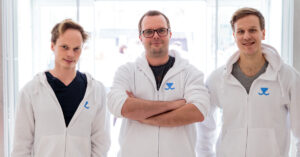Through analysis of cognitive, cultural, and psychological factors, behavioural science has altered the executive search and talent acquisition market. Now, it is poised to have had a transformative effect on employers, changing the way that companies seek and hire candidates in a digital-first era.
David Bernard, CEO of innovative predictive recruitment platform AssessFirst, evaluates how deeper understandings of behaviour will attract and retain the right candidates for businesses and recruiters.
A decade ago, behavioural science was a niche field of study, consigned to science journals and academic papers. Now, there are over 300 behavioural companies working with governments and industries across the globe. Even the proponents of the theory did not dare to imagine such an impactful ascendency.
But very few of these companies are specifically focused on recruitment. Given that this practice reveals to us, in the words of behavioural scientist Richard Shotton, “how people actually behave, rather than how they claim to behave”, an inevitable change is imminent. The vast advantages offered to recruiters and businesses means behavioural science methods will become integral to the standard recruitment processes.
What is behavioural science?
Essentially, it is a social science discipline with a significant distinction. Instead of simply observing what people do, it attempts to understand why they do them.
It does this by exploring how heuristics (choices made that lead to a sufficient answer, rather than the optimal, rational one), and biases influence our decision making. In this sense, it draws from other fields of study including neuroscience, psychology, biology and even political science.
This means behavioural science can find patterns in the irrational decisions we make. In other words, it rationalises our irrationality. When these patterns emerge, it provides an intriguing and inciteful predictor of irrational choices – and, for that matter, rational ones.
And, when those patterns are aligned with the cultural and psychological make-up of an individual, we can begin to understand the motivations behind an individual choice.
This makes it a powerful tool for any organisation that is interested and passionate about ‘people’. Therefore, we can expect the recruitment industry to accelerate its integration of behavioural science imminently. The question for recruiters and C-Suite individuals at present is, how much resource and time will be wasted on the wrong candidates?
How is behavioural science already being used?
A central text for behavioural science is Richard Thaler and Cass Sunstein’s 2008 book Nudge: Improving Decisions About Health, Wealth, and Happiness. Before the publication of the book, this scientific discipline had meandered somewhat, but Thaler and Sunstein systemised it, applying their findings primarily to economic theory.
They argued that economic theory too often assumes that “each of us thinks and chooses unfailingly well”. Thaler and Sunstein demonstrate the misconceptions and biases that lead to the irrationality of our choices. The book had a tremendous impact on economic theory with Thaler winning the Nobel Prize for Economics in 2017.
Contained within the book are recommendations for finance, health, the environment, schools and even marriage. And, as if to underline the influence of the text, these are the precise fields in which newly founded behavioural science organisations have emerged.
In finance, we’ve seen behavioural science look at how psychological ‘nudges’ can influence consumers to make a preferred choice. In health, it is being used to understand certain disorders and harmful behaviours, and in education, behavioural science attempts to lead students to capitalise on educational opportunities.
How can behavioural science improve recruitment?
Within recruitment, behavioural science isn’t just testing candidates. It is eradicating the deficiencies contained within traditional hiring processes. For example, much of the evidence indicates that we are prone to employ people similar to ourselves, particularly in experience, presentation style and even in choices of hobbies.
There is no rationality in this approach. It is an example of heuristics in action, leading to a potentially illogical and costly decision.
Recruitment typically relies on unstructured interviewing and CV analysis. Consider that hiring the wrong person can, according to U.S Department of Labor, cost at least 30 percentof the employee’s first year earnings. Is it tenable that a critical business practice depends on such primitive processes?
An evidence-based approach is surely long overdue. Behavioural science provides us with exactly that. Rather than intuitively selecting a person you believe to fit into the culture of a company, at AssessFirst, for example, we use AI technology to define that culture and characterise the specific role, using non-static, live data.
By means of a sophisticated algorithm, candidates are invited to take a psychometric test as a part of the wider recruitment process. This provides two significant advantages to our customers and partners: biases the recruiter may unintentionally hold are removed plus employers can access data that shows them not just how a candidate thinks and acts, but why they think and act in that way.
Behavioural science has had – and is having – a significant impact on the way organisations of all shapes and types operate. For recruiters, a method that focuses on the behaviour of staff, refines the hiring process and links a candidate to company culture, could have the biggest impact of all.

![Read more about the article [Weekly funding roundup] Indian startup ecosystem buzzing with IPO, M&A activity; venture investments decline](https://blog.digitalsevaa.com/wp-content/uploads/2021/07/Weeklyimage-1577460362436-300x150.png)



![Read more about the article [Funding alert] UpScalio raises $15M led by Gulf Islamic Investments](https://blog.digitalsevaa.com/wp-content/uploads/2021/12/CopyofImageTagsEditorialTeamMaster1-1639490904586-300x150.jpg)
![Read more about the article [Funding alert] Upstox turns unicorn! Raises $25M from Tiger Global as part of ongoing round: Source](https://blog.digitalsevaa.com/wp-content/uploads/2021/11/YourStoryRKSVFunding1568981823026png-300x150.png)


